Related Research Articles

The International Criminal Tribunal for Rwanda was an international court established in November 1994 by the United Nations Security Council in Resolution 955 in order to adjudicate people charged for the Rwandan genocide and other serious violations of international law in Rwanda, or by Rwandan citizens in nearby states, between 1 January and 31 December 1994. The court eventually convicted 61 individuals and acquitted 14.
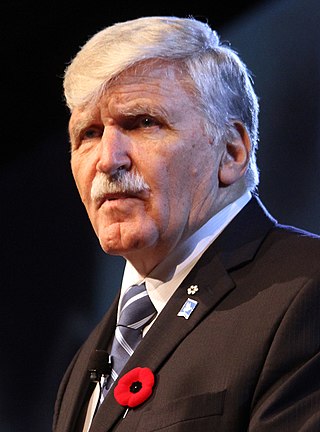
Roméo Antonius Dallaire is a retired Canadian politician and military officer who was a senator from Quebec from 2005 to 2014, and a lieutenant-general in the Canadian Armed Forces. He notably was the force commander of UNAMIR, the ill-fated United Nations peacekeeping force for Rwanda between 1993 and 1994, and for trying to stop the genocide that was being waged by Hutu extremists against Tutsis. Dallaire is a Senior Fellow at the Montreal Institute for Genocide and Human Rights Studies (MIGS) and co-director of the MIGS Will to Intervene Project.
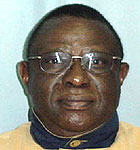
Théoneste Bagosora was a Rwandan military officer. He was chiefly known for his key role in the 1994 Rwandan genocide for which he was sentenced to life imprisonment by the International Criminal Tribunal for Rwanda (ICTR). In 2011, the sentence was reduced to 35 years' imprisonment on appeal. He was due to be imprisoned until he was 89. According to René Lemarchand, Bagosora was "the chief organizer of the killings". On 25 September 2021, he died in a prison hospital in Mali, where he was being treated for heart issues.

Radio Télévision Libre des Mille Collines (RTLM), nicknamed "Radio Genocide" or "Hutu Power Radio", was a Rwandan radio station which broadcast from July 8, 1993, to July 31, 1994. It played a significant role in inciting the Rwandan genocide that took place from April to July 1994, and has been described by some scholars as having been a de facto arm of the Hutu regime in Rwanda.

Butare was a province (prefecture) of Rwanda prior to its dissolution in January 2006. Butare city was the second largest city in Rwanda and one of the nation's former twelve provinces. It is located in south-central region of the country and borders Burundi to the south. It had a population of 77.449 as of January 2006.
The Gacaca courts were a system of transitional justice in Rwanda following the 1994 genocide. The term 'gacaca' can be translated as 'short grass' referring to the public space where neighborhood male elders (abagabo) used to meet to solve local problems. The name of this system was then adopted in 2001 as the title of the state's new criminal justice system "Gacaca Courts" to try those deemed responsible for the 1994 Genocide against the Tutsi where over 1,000,000 people were killed, tortured and raped. In 1994, the United Nations Security Council created the International Criminal Tribunal for Rwanda to try high-ranking government and army officials accused of genocide, war crimes, and crimes against humanity. The Gacaca Courts were established in law in 2001, began to operate on a trial basis in 2002 and eventually came to operate as trials throughout the country by early 2007. The Gacaca courts were presented as a method of transitional justice, claimed by the Rwandan government to promote communal healing and rebuilding in the wake of the Rwandan Genocide. Rwanda has especially focused on community rebuilding placing justice in the hands of trusted citizens.

Justice Inés Mónica Weinberg de Roca is an Argentine Judge of the Supreme Court of city of Buenos Aires and a Judge of the United Nations Appeals Tribunal in New York City. She was born in Buenos Aires, Argentina on December 16, 1948.
Simon Bikindi was a Rwandan musician and singer who was prominent in Rwanda during the 1980s and 1990s. His patriotic and ultranationalist songs were playlist staples on the national radio station Radio Rwanda during the Rwandan Civil War. For his actions during the Rwandan genocide, he was tried and convicted for incitement to genocide by the International Criminal Tribunal for Rwanda (ICTR) in 2008. He died of diabetes at a Beninese hospital in December 2018.
Félicien Kabuga is a Rwandan businessman and genocide suspect who played a major role in the run-up to the Rwandan genocide. A multimillionaire, he was closely connected to dictator Juvénal Habyarimana's Hutu nationalist MRND party and the Akazu, an informal group of Hutu extremists who helped lead the Rwandan genocide.
Callixte Nzabonimana is a former Rwandan politician who is accused of participating in the Rwandan genocide.
Ferdinand Nahimana is a Rwandan historian, who was convicted of incitement to genocide for his role in the Rwandan genocide.

Charles Ayodeji Adeogun-Phillips is a former United Nations genocide and war crimes prosecutor, international lawyer and founder of Charles Anthony (Lawyers) LLP.

United Nations Security Council resolution 955, adopted on 8 November 1994, after recalling all resolutions on Rwanda, the Council noted that serious violations of international humanitarian law had taken place in the country and, acting under Chapter VII of the United Nations Charter, established the International Criminal Tribunal for Rwanda (ICTR).
United Nations Security Council resolution 1165, adopted unanimously on 30 April 1998, after recalling Resolution 955 (1994), the council established a third trial chamber at the International Criminal Tribunal for Rwanda (ICTR).
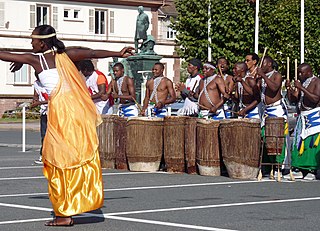
The National Ballet of Rwanda, also known as the Urukerereza National Ballet, is a Rwandan dance company. It was created in 1974 at the behest of President Juvenal Habyarimana. Their long-running show features traditional Rwandan songs, drums and dances.
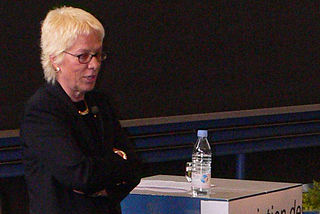
United Nations Security Council resolution 1503, adopted unanimously on 28 August 2003, after recalling resolutions 827 (1993), 955 (1994), 978 (1995), 1165 (1998), 1166 (1998), 1329 (2000), 1411 (2002), 1431 (2002) and 1481 (2003), the Council decided to split the prosecutorial duties of the International Criminal Tribunal for the former Yugoslavia (ICTY) and the International Criminal Tribunal for Rwanda (ICTR) which had previously been under the responsibility of one official, Carla Del Ponte, since 1999.
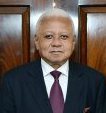
Mohamed Chande Othman is a Tanzanian lawyer and a former Chief Justice of Tanzania.
Drew White (QC) is an international lawyer from Canada best known for his role in the conviction of Colonel Theoneste Bagosora, who the media dubbed "the mastermind" of the 1994 Rwanda genocide and who White referred to in his closing trial submissions as one of the "enemies of the human race".

Gabrielle Louise McIntyre (Australian) is an international legal practitioner, jurist, and served as the Chairperson of the Seychelles' Truth, Reconciliation and National Unity Commission.
Segun Jegede is an international lawyer from Nigeria who has practiced law for over three decades at domestic and international level. A prolific writer and author, Jegede's career highlights comprise his extensive work of over 13 years at the United Nations International Criminal Tribunal for Rwanda (UNICTR), and advocacy work in international criminal law through the Legal Watch and Human Rights Initiative, a registered non-profit organization he co-founded. His work at the UNICTR mainly revolved around the investigation and prosecution of some of the known masterminds of the egregious crimes committed during the Rwandan genocide. His perspectives of the historical events which led to the Rwandan genocide and the ground breaking case law generated by the UNICTR established to prosecute those who bear the greatest responsibility for the genocide are documented in his book, “The Rwandan Genocide: Historical Background and Jurisprudence”. In the book, Jegede provides a riveting account of the pre-genocide history of Rwanda, including the often overlooked elements that make the Rwandan genocide one of the worst human tragedies of our time. Through the cases, in an engaging and candid style, the Author reveals several ground breaking decisions of the UNICTR such as the pronouncement of rape as genocide and the conviction of a woman for rape as a crime against humanity. Jegede serves as a consultant for the International Labour Organization (ILO) on human trafficking issues and the National Human Rights Commission.
References
- ↑ Jason T. McCoy, Mbwirabumva ("I Speak to Those WhoUnderstand"): Three Songs by Simon Bikindi and the War and Genocide in Rwanda, PhD Thesis, Florida State University, 2013, p.154.
- ↑ James E. K. Parker (2015). Acoustic Jurisprudence: Listening to the Trial of Simon Bikindi. OUP Oxford. pp. 75–. ISBN 978-0-19-105465-5.